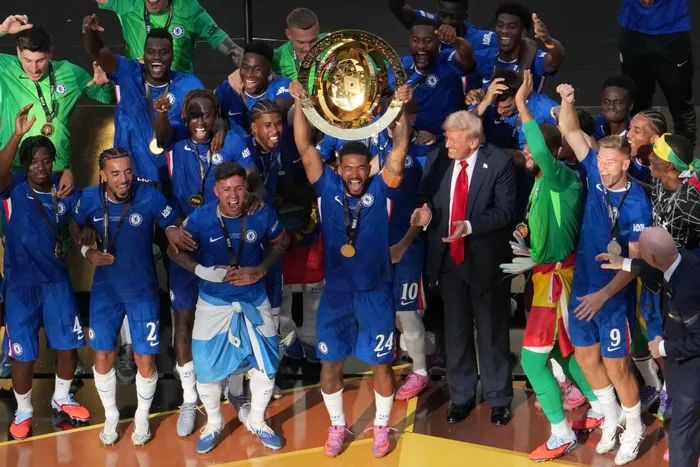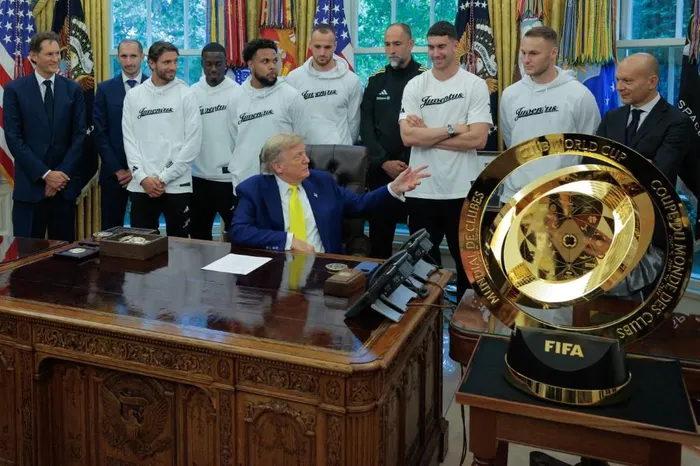
Chelsea won the Fifa Club World Cup this past Sunday. Photo: AFP
Image: AFP
To be honest, few would have been surprised to learn that the real Fifa Club World Cup trophy — designed by Tiffany & Co — is destined to remain in the White House in perpetuity.
It’s the kind of garish Americana that fits neatly with the current president’s brand: shiny, performative, and tailor-made for a press conference. Another glittering bauble to be paraded as proof of greatness — regardless of who actually earned it on the pitch.
“I said, ‘When are you going to pick up the trophy?’” Trump remarked earlier this week, while showing it off at the White House. “And (Fifa) said, ‘We’re never going to pick it up. You can have it forever in the Oval Office. We’re making a new one.’
“And they actually made a new one,” he added. “So, that was quite exciting, but it is in the Oval right now.”
So, after all that effort — seven matches, difficult conditions, the fatigue of a draining season — the eventual winners, Chelsea, didn’t even get to take home the real McCoy. Instead, some replica will sit in the trophy cabinet at Cobham.
Moreover, they didn’t even get to enjoy their moment properly after beating PSG 3–0. Trump gate-crashed the celebration, too.
These moments kind of encapsulate the problems with the Club World Cup for me. It’s a political statement — not so much for the US (although they certainly profited from it), but for Fifa. It was created to satisfy the vanity of that organisation, to strong-arm the international association’s members into participating.

According to reports the official Fifa Club World Cup trophy will remain in the White House. Photo: AFP
Image: AFP
They dangled prestige, a shedload of money and the title of “world champions”, but much like the replica trophy, it still means very little. Chelsea will not — at least not in this generation — look back on winning the competition as a defining moment in their history. That’s not to say that, in 100 years’ time, it won’t carry some aura, but right now it feels all very manufactured.
From a purely commercial standpoint, you can’t argue with it. Chelsea are R20 billion richer, their American owners have a new PR avenue to explore, complete with catchphrases to inspire the existing fanbase, while trying to court new supporters in the US and Asia. And a trophy is still a trophy.
But, had they lost, the narrative would have been the usual fallback: “It was a good experience for this young team. It’ll help them grow and prepare for next season.”
I’m a Chelsea fan. On Monday, after winning the cup — if you can call the Voyager-inspired design a cup — I woke up and immediately started riling up my fellow football fans (especially the Liverpool ones). I did so with tongue firmly in cheek, poking and prodding for a reaction.
“Good morning, champs,” I wrote to my fellow Blues supporters, with a knowing smile.
I didn’t do it because I care deeply about the win (although I am proud of the performance) but rather because of the absurdity of it all.
When it comes down to it — was it the tournament a success?
It certainly was, in its own peculiar way. Just not in on-field terms. It felt like winning an elongated Community Shield — and I remain far more concerned about the upcoming Premier League and Uefa Champions League. I believe most, if not all, of the clubs that participated — regardless of where they come from — harbour a similar sentiment.
Maybe one day the Club World Cup will carry the weight its organisers desperately want it to. But until then, it remains a curious experiment: part sporting contest, part PR stunt — with just enough gloss to convince us it matters, even if we know deep down it doesn’t.
After all, football has a funny way of turning sideshows into centrepieces.
Related Topics: